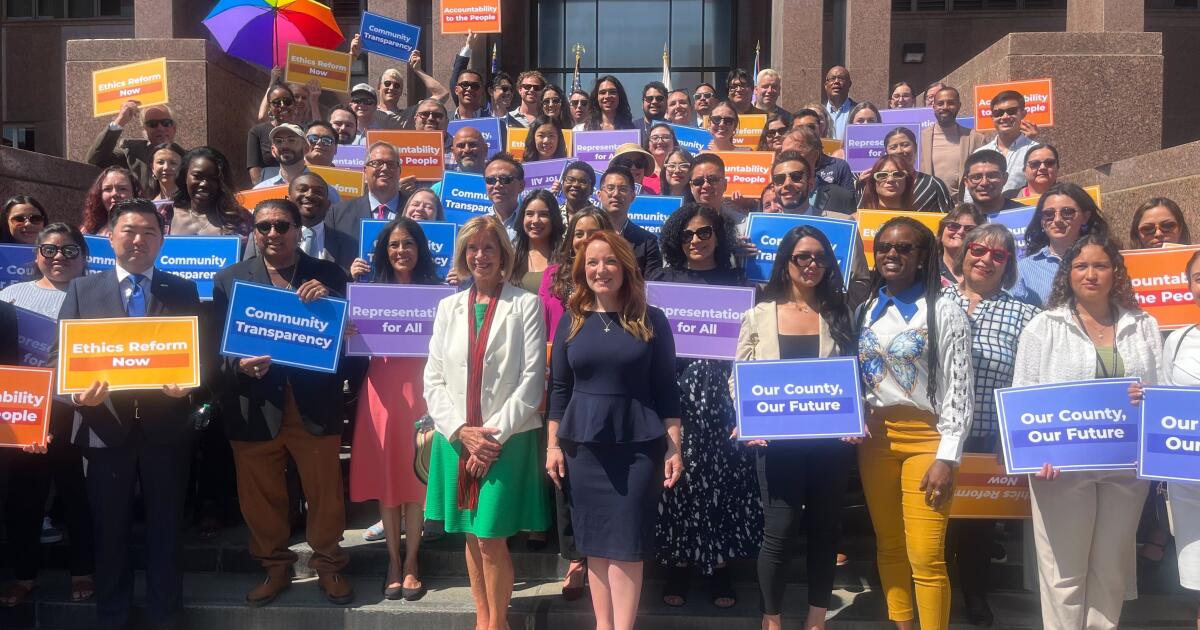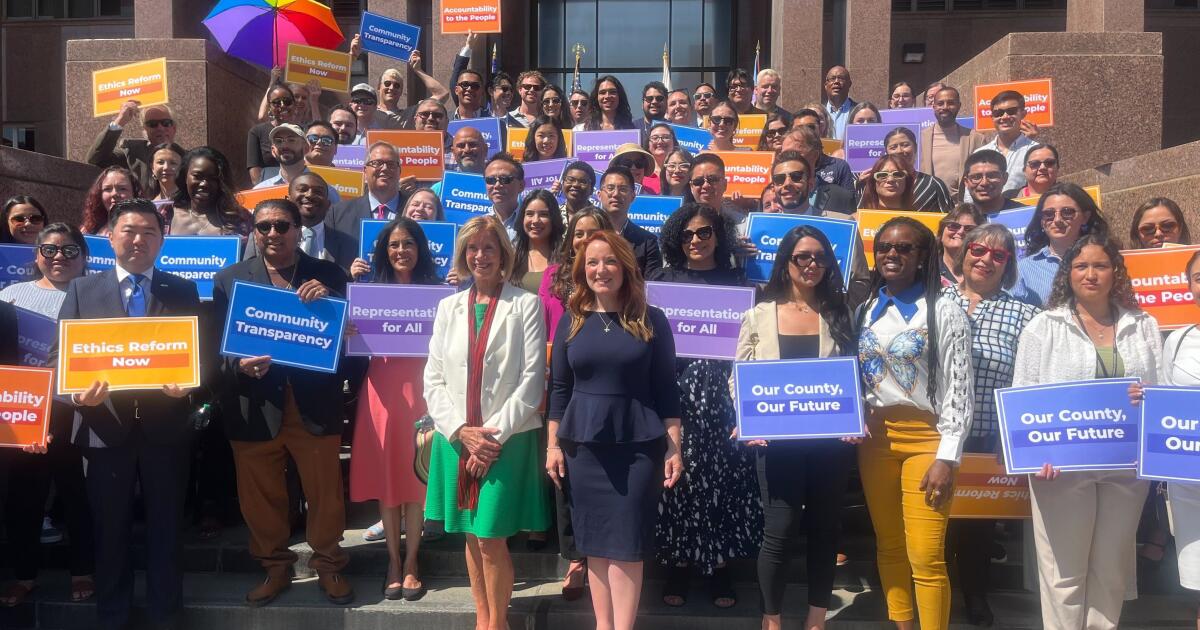L.A. County accidentally undid its anti-incarceration measure. Now what?
Los Angeles County leaders are scrambling to restore a sweeping racial justice initiative that voters accidentally repealed, a mistake that could threaten hundreds of millions of dollars devoted to reducing the number of people in jail.
County supervisors unanimously voted Tuesday to ask their lawyers to find a way to bring back the ballot measure known as Measure J, which required the county to put a significant portion of its budget toward anti-incarceration services.
Voters learned last week that they had unwittingly repealed the landmark criminal justice reform, passed in 2020 in the heat of the Black Lives Matter movement, when they voted for a completely unrelated measure to overhaul the county government last November.
Supervisor Lindsey Horvath, who spearheaded the county overhaul — known as Measure G — along with Supervisor Janice Hahn, called it a “colossal fiasco.”
“This situation that has unfolded is enraging and unacceptable at every level. What has transpired is sloppy,” Horvath said Tuesday. “It’s a bureaucratic disaster with real consequences.”
The county says it’s looking at multiple options to try to get Measure J permanently back in the charter — which dictates how the county is governed — including a change in state law, a court judgment or a ballot measure for 2026.
“We cannot and we won’t let this mistake invalidate the will of the voters,” Hahn said.
County lawyers say the mistake stems from a recently discovered “administrative error.”
Last November, voters approved Measure G, which expands the five-person Board of Supervisors to nine members and brings on an elected chief executive, among other overhauls.
What no one seemed to realize — including the county lawyers who write the ballot measures — is that one measure would wipe out the other.
Measure G rewrote a chunk of the charter with no mention of anti-incarceration funding, effectively wiping out the county’s promise to put hundreds of millions toward services that keep people out of jail and support them when they leave.
The repeal will take effect in 2028, giving the county three years to fix it.
“I do agree that there’s all kinds of reasons to be outraged, but the sky is not falling. Even if you think the sky is falling, it won’t fall until December 2028,” said Rob Quan, who leads a transparency-focused good-government advocacy group. “We’ve got multiple opportunities to fix this.”
The mistake was first spotted last month by former Duarte City Councilmember John Fasana, who sits on a task force in charge of implementing the county government overhaul. The county confirmed the mistake to The Times last week, a day after Fasana publicly raised the issue to his unsuspecting fellow task force members.
The measure’s critics say the mistake adds credence to their arguments that the county overhaul was put together too hastily.
“It seems to be that if one has to go back on the ballot, it ought to be [Measure] G,” said Fasana, noting it passed by a narrower margin.
Otherwise, he says, the county has set an unnerving precedent.
“It’s almost like setting a blueprint to steal an election,” said Fasana, who opposed both the anti-incarceration funding and the government overhaul measures. “You’ve got this way to basically nullify something that was passed by voters.”
Some worry that putting either measure back on the ballot runs the risk of voters rejecting it this time around.
Measure G faced significant opposition — including from two sitting supervisors — who argued an elected chief executive would be too powerful and the measure left too much of this new government ill-defined. It narrowly passed with just over 51% of the vote.
The anti-incarceration measure also faced heavy opposition in 2020, particularly from the Assn. for Los Angeles Deputy Sheriffs, which spent more than $3.5 million on advertising on TV and social media. The measure passed with 57% of the vote.
A Los Angeles County Superior Court judge ruled it unconstitutional after a group of labor unions — including the sheriff’s deputies union — argued it hampered politicians’ ability to manage taxpayer money as they see fit. An appellate court later reversed the decision.
Measure J requires that 10% of locally generated, unrestricted L.A. County money be spent on social services such as housing, mental health treatment and other jail diversion programs. That’s equivalent to roughly $288 million this fiscal year. The county is prohibited from spending the money on the carceral system — prisons, jails or law enforcement agencies.
Derek Hsieh, the head of the sheriff’s deputies union and a member of the governance reform task force, said the union had consulted with lawyers and believed the county would be successful if it tried to resolve the issue through a court judgment.
“A change in state law or running another ballot measure — it’s kind of like swimming upstream,” he said. “Those are the most expensive difficult things.”
Megan Castillo, a coordinator with the Reimagine LA coalition, which pushed for the anti-incarceration measure, said if the group has to go back to the ballot, it will try to slash the language that it feels gives the county too much wiggle room on how funding is allocated. The coalition has clashed repeatedly with county leadership over just how much money is actually meant to be set aside under Measure J.
“If we do have to go to the ballot box, we’re going to be asking for more,” she said.
City Councilmember Eunisses Hernandez, who helped get the anti-incarceration measure on the ballot, said she felt suspicious of the error by county lawyers, some of whom she believed were never fully on board with the measure in the first place.
“I just feel like they’re too good at their jobs for this error to occur,” said Hernandez, who said the news landed like a “slap in the face.”
County leaders have emphasized that the error was purely accidental and brushed aside concerns that the repeal would have any tangible difference on what gets funded.
When Measure J was temporarily overturned by the court, the board promised to carry on with both the “spirit and letter” of the measure, reserving a chunk of the budget for services that keep people out of jail and support those returning. That will still apply, they say, even if Measure J is not reinstated.
The motion passed Tuesday directs the county to work on an ordinance to ensure “the continued implementation of measure J” beyond 2028.

